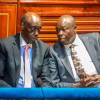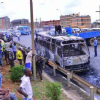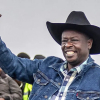Kenyan Activist Boniface Mwangi Released After Three-Day Detention in Tanzania

Kenyan activist and journalist Boniface Mwangi was released on Thursday after three days of detention in Tanzania, prompting a surge in diplomatic tensions between the two East African nations and widespread condemnation from human rights organisations.
Mwangi’s release follows escalating pressure on Tanzanian authorities to account for his detention and ensure his well-being. Musalia Mudavadi, Kenya’s Cabinet Secretary for Foreign and Diaspora Affairs, has confirmed Mwangi’s release, signalling the end of a tense diplomatic standoff. Mwangi had been detained on Monday while in Tanzania to attend the court hearing of opposition figure Tundu Lissu. The circumstances surrounding his detention remained opaque, fueling anxieties among his family, supporters, and diplomatic circles.
Upon his release, Mwangi was reportedly found abandoned near Ukunda in Kwale County, approximately 92 kilometres north of the Tanzanian border at Lunga Lunga. His lawyer, James Kamau, stated that Mwangi was in a weakened condition and had difficulty walking due to injuries allegedly sustained during his detention. Initially, his family planned to airlift him to Nairobi for medical treatment, but instead, they opted for urgent care in Ukunda before arranging his transport.
The detention of Mwangi strained diplomatic relations between Kenya and Tanzania throughout the week. The Kenyan Ministry of Foreign Affairs made repeated requests for consular access to Mwangi, which were reportedly denied by Tanzanian officials. In response, Kenya invoked provisions from the Vienna Convention on Consular Relations, asserting the right of consular officers to communicate with and assist their nationals.
The lack of transparency from Tanzanian authorities ignited protests in Nairobi, where hundreds of activists gathered near the Tanzanian High Commission and in the central business district, demanding Mwangi’s immediate release. Police maintained a heightened presence to prevent potential clashes during the demonstrations.
Mwangi's detention was compounded by reports that several other prominent figures had been deported from Tanzania in recent days. Among those barred from entering the country were former Justice Minister Martha Karua, former Chief Justice Willy Mutunga, Vocal Africa CEO Hussein Khalid, and activist Hanifa Adan. Adding to the complexity of the situation, Ugandan national Agather Atuhaire, who was detained alongside Mwangi, remains unaccounted for, raising further concerns about her safety and whereabouts.
Mwangi’s detention has triggered broader discussions regarding Tanzania's stance on political dissent and human rights activism. His presence at Tundu Lissu's court proceedings, an outspoken critic of Tanzanian governance, underscored the precarious environment for political activists in the region. Human rights organisations have voiced concerns over the shrinking space for free speech and civil liberties in Tanzania, emphasising the need for greater protection of activists and dissenters.
Before his detention, Mwangi was reportedly involved in a heated verbal exchange with individuals claiming to be Tanzanian authorities. A video circulating online showed Mwangi refusing to open his hotel room door, citing concerns for his safety. This incident has fueled speculation that his arrest may have been politically motivated, a suspicion reinforced by the deportation of other activists.
Mwangi’s physical condition upon release has intensified scrutiny of Tanzania's treatment of detainees. His lawyer's disclosure that Mwangi exhibited signs of physical distress has raised fears of possible torture during his time in custody. Images of the activist in a visibly weakened state have circulated widely, prompting human rights groups to call for an independent investigation into the circumstances of his detention and his treatment while incarcerated.
Despite Mwangi’s release, public outrage persists, with protesters continuing to demand accountability and asserting that his treatment violated fundamental human rights and diplomatic protocols. Former Chief Justice David Maraga issued a statement condemning Tanzania’s failure to provide Mwangi with access to legal counsel or consular representation, characterising the ordeal as a direct violation of international law.
The detention has reignited broader discussions about press freedom and civil activism in East Africa. Tanzania has faced increasing criticism for its handling of opposition figures and activists, raising concerns about its commitment to democratic principles. Mwangi's case is viewed as another example of the challenges faced by individuals advocating for transparency and reform.
While Mwangi undergoes medical treatment in Ukunda, his supporters eagerly await his first public statement since the ordeal. His family is expected to address the media once his condition stabilises, providing further insight into the events that transpired during his detention. Meanwhile, activists continue to demand justice for those still unaccounted for, including Atuhaire, whose whereabouts remain unknown.














Add new comment